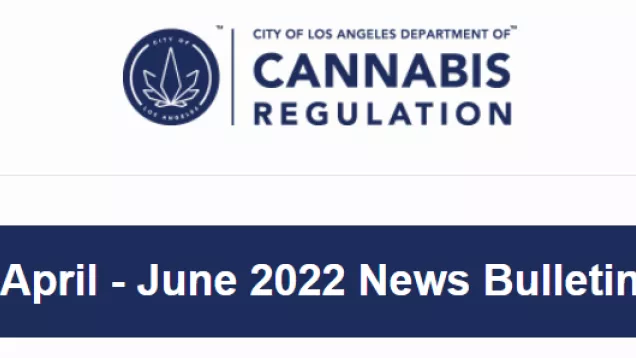

Greetings!
Since my announcement as Interim Executive Director of the Department of Cannabis Regulation (DCR), there have been a number of new and exciting departmental developments to report. But, before I share how DCR is moving toward the future, I would like to again express my profound admiration and deepest gratitude to former Executive Director Cat Packer, whose tireless commitment to the City laid the foundations on which DCR is continuing to grow and advance our mission.
DCR remains committed to keeping social equity as the core tenet guiding the Department; processing license applications pending before the Department; improving communications with our stakeholders and applicants; and ensuring every licensee is operating in compliance with all laws, rules, and regulations.
2022 has been and will continue to be an exceptionally busy year for DCR. To date, DCR has been working on the following:
- On April 6, 2022 the City Council approved updated Rules and Regulations. These Rules and Regulations implement the recently-adopted ordinance amendments and promote efficiency and transparency. DCR has also published updated workflows for the Pre-Application Review Process, Refiling Process and the Temporary Approval Process reflecting changes established in the ordinance amendments and Rules and Regulations. DCR is committed to informing applicants and licensees about these changes through educational webinars and other communications.
- On May 26, 2022, DCR reopened Social Equity Individual Applicant Verification. The verification process allows anyone who meets the qualifying criteria to be verified as a Social Equity Individual Applicant and participate in the application opportunities available only to verified Social Equity Individual Applicants. For example, delivery and cultivation licenses are reserved for verified Social Equity Individual Applicants until January 1, 2025, and only certain verified Social Equity Individual Applicants may participate in Phase 3 Retail Round 2 scheduled to take place at the end of this year.
- DCR has continued the expansion of the Social Equity Program. The Business, Licensing, and Compliance (BLC) program continues to directly assist Social Equity Individual Applicants in launching their licensed commercial cannabis businesses. Since its inception in August 2021, the BLC program has hosted more than 50 live webinars. Additionally, DCR’s online Learning Management System (LMS) offers more than 90 hours of online educational cannabis business content created and curated by subject matter experts. DCR also has a resource for employers and employees to post or find out about jobs in the cannabis space via its Job Board.
- DCR has started to transition all licensees with Temporary Approval through the environmental review process in preparation for the annual licensing process.
- DCR has increased its outreach to applicants and stakeholders through communications and increased access. For example, DCR has hosted seven webinars in the last two months which have focused on new policy changes, ordinance updates, and the Social Equity Verification Process. DCR has also hosted monthly, hour-long Virtual Lunch Q & A sessions with Assistant Executive Director Jason Killeen to allow individuals to ask questions and receive answers in real time.
- DCR continues to work with LAPD, the Department of Water and Power, the Department of Building and Safety, the City Attorney’s Office, and Mayor’s Office to develop and implement a progressive enforcement strategy regarding unlicensed businesses.
- Launched in 2020, the SPARK initiative was designed to receive feedback from key and local stakeholders on issues that matter to, and impact, the Los Angeles cannabis community. SPARK has helped DCR make recommendations to the Commission and City Council based on stakeholder-identified priorities as well as additional policy recommendations and programming needed to repair the harms of past cannabis policies and its enforcement, foster the equitable development and implementation of cannabis policy reform, and promote equity within the cannabis industry. Scroll down to watch the final video.
It is my goal to help make our City a more diverse and equitable place to live and work, and to keep our community informed about the work we are doing. I hope that you find the information below helpful, and I look forward to a continued partnership with those we serve.
Regards,

Michelle Garakian
Interim Executive Director
City of Los Angeles Department of Cannabis Regulation
LICENSING
Citywide Data
694 Commercial Cannabis Business Premises have Temporary Approval to operate in the City. Many businesses have vertically integrated parts of their operation and hold more than one Temporary Approval to operate. The table below illustrates the number and type of Temporary Approvals issued in the City.
No. of Temporary Licenses Issued to Licensed Businesses
(Many Businesses hold more than one License)
| Retail Storefront | Delivery Only | Non-Volatile Manufacturing | Distribution | Cultivation | Testing Lab | TOTAL |
| 243 | 62 | 320 | 394 | 376 | 6 | 1401 |
Updated Licensing Map
On June 10, 2022, the Licensing Map on the DCR website was updated to reflect the latest sensitive use information available. This map is for informational purposes only, and the data represented on the map is collected from data sources outside of DCR’s control, such as other government agency websites, and therefore may change without notice. You can click on the Layer List on the side in order to filter the information by application status, such as whether the business has Temporary Approval or an application still pending, as well as social equity status. An applicant or potential applicant should not rely on the information in this map for confirmation that a proposed business premises meets the City’s zoning, sensitive use, or undue concentration restrictions, or that it will have its application processed by DCR.
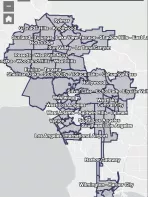
General Licensing Update
Revised Timelines
The ordinance amendments that became effective on April 15, 2022 contained a number of provisions that added clarity and established processing timelines for the Pre-Application, Temporary Approval, and various application modification processes. After complete documentation is submitted and all applicable fees are paid, Applicants can generally expect to finish the Pre-Application Review Process within 30 days. Once completed documentation is submitted and fees are paid, Applicants can generally expect to finish the Temporary Approval Process within 60 days. Most application modifications can be completed within 60 days from the date complete documentation is submitted and all fees are paid. Some processing timelines may vary or exceed these timeframes if further documentation is needed, a modification request is submitted, or other unexpected events occur.
Updated Rules and Regulations, Forms and Workflows
On April 6, 2022, the City Council approved updated Rules and Regulations. These Rules and Regulations implement the recently adopted ordinance amendments and promote efficiency and transparency. DCR has also published updated workflows for the Pre-Application Review Process and the Temporary Approval Process reflecting changes established in the ordinance amendments and Rules and Regulations.
Abandonment and Refiling
On April 15, 2022, Ordinance No. 187459 became effective. Among other amendments, the ordinance reinforced that all required information, forms and/or documents shall be submitted through the DCR Licensing Portal within 30 days, and all fees shall be paid within 30 days of the date of the invoice issuance. The ordinance also created a process for certain Applicants with an abandoned application to refile the application within one calendar year of the date the Applicant was notified of abandonment. The option to refile an application has been enabled on the DCR Licensing Portal, and a refiling workflow has been posted to our website to assist Applicants through this process.
Equity Share Review
DCR has revised its Equity Share Review process to streamline application processing. Each licensing analyst is now responsible for initial reviews of Equity Share documentation using a detailed process meant to identify common violations of the Los Angeles Municipal Code. Applicants are provided a correction sheet and are given multiple opportunities for revisions to move forward. By decentralizing the review process, DCR anticipates this change will reduce review time from 120 to 60 days.
Expedited Processing
Applicants and Licensees may request expedited processingof application or modification records through the DCR Licensing Portal.
Social Equity Individual Applicant Verification under LAMC 104.20(b)(1)
SEIA Eligibility Verification is a process where an individual may request to be verified to participate in the Social Equity Program. The Social Equity Program focuses on the inclusion and support of individuals in the City’s legal cannabis marketplace who may have been negatively or disproportionately impacted by prior cannabis criminalization. Cannabis business licenses for retail, delivery, and cultivation are exclusively available to verified Social Equity Individual Applicants until January 1, 2025. For more information on SEIA Verification, please read the Social Equity Program section of this newsletter.
Phase 3 Retail Round 2
In 2020, Community and stakeholder feedback guided the City Council to amend the LAMC to effectuate changes to the implementation of Phase 3 Retail Round 2 (P3RR2), including the following items:
Lottery Selection Process
The first-come, first-served process from Phase 3 Retail Round 1 has been replaced with a lottery selection process.
No Location Requirement
Applicants will not need to provide proof of the legal right to occupy a proposed business premises at the outset for the application process, and will now have one year to secure a business premises location after being selected in the lottery.
BLC Availability
P3RR2 Applicants will have access to over 90 hours of on-demand Business Licensing and Compliance (BLC) assistance content through DCR’s Learning Management System (LMS), millions of dollars of funding through the SEED Grant Program, and Pro-Bono Legal Assistance through the Los Angeles County Bar Association.
Application Process Improvements
Amendments made to the Cannabis Procedures Ordinance over the last two years have resulted in a P3RR2 application process that is simpler, faster, less cumbersome, and less expensive than it was in P3RR1. Application workflows are now clearly delinneated with expected timelines and documentation, redundant application requirements with other State, County, and City agencies have been removed, and internal DCR review processes have been streamlined.
Licensing-Specific Webinars and Events
DCR hosted two well-attended licensing webinars on March 30 and April 14, 2022 where staff discussed the newly adopted ordinance and updated Rules and Regulations as well as answered at least 53 questions from the audience. You can find a recording of these webinars and the presentation slides here. Combined, nearly 500 people tuned in live or watched the recorded webinars.
Assistant Executive Director Jason Killeen is hosting monthly virtual Q&A lunchtime webinars. A webinar was held on May 3 and June 2 with more than 300 individuals submitting RSVPs to attend and where he answered 90 combined questions regarding a wide array of topics including the upcoming Social Equity Individual Applicant verification process, Phase 3 Retail Round 2, and the application refiling process. A recording of the events can be found here.
ENFORCEMENT AND COMPLIANCE
The newly created Compliance and Enforcement Division (CED) within DCR is responsible for coordinating compliance and enforcement efforts with other city, county and state agencies that have a role in the permitting and approval processes of commercial cannabis businesses. The Division’s procedures, protocols and workflows are being solidified to triage and investigate complaints against licensed businesses which may result in the issuance of violation notices and penalty fees.
The CED’s goal is to achieve compliance through a progressive and educational strategy. As part of that effort, the CED will be sending correspondence to all of its operators that will include information about CED and a link to DCR’s Regulation No. 5, “Operational Requirements and Violations.'' The instructions will require that an attestation be submitted to the Department where the operator and licensee acknowledge to have read the regulations and agree to abide by them. Subsequently, members of the CED will visit all storefront locations to assist operators with any questions or issues related to compliance with the operating requirements.
In addition, the CED is working to create a compliance and enforcement component in the DCR Licensing Portal (Accela) that will extract complaint information from the Cannabis Complaint Portal to the Accela enforcement record. The system will then update the licensing record with a compliance status that may affect issuance, suspension, revocation or renewal of a license.
The CED is also meeting with the Information Technology Agency to enhance and customize the Cannabis Complaint Portal to do the following, among other features: 1) provide the public with access to check the status of their complaint; 2) automate complaint status communications to be emailed to the complainant; 3) provide state, county and other city agencies a separate and simple way to submit to DCR enforcement related violation notices issued to licensees which may affect issuance, suspension, revocation or renewal of a license; and 4) create a investigate complaint log for the CED team to track all compliance and enforcement activity related to one or more complaints received that related to a single Business Premises location.
The CED will also be leading the City’s implementation of the County’s inspection and emblem program, a joint effort designed for consumers to easily identify legal cannabis retailers and for businesses to comply with safety standards. In anticipation of its implementation, DCR collaborated with the LA County Public Health Department to host a webinaron April 28 about inspection compliance and the new emblem program.
On May 4, Councilmember Paul Koretz introduced a motion to start the process to implement the emblem program with the County. On June 7, 2022, the City Council adopted a motion (CF 22-0516) instructing the City Attorney’s Office to draft the ordinances necessary to amend LAMC Section 104.23 to establish a retailer Emblem Program in conjunction with the County and to incorporate the relevant provisions of the County Code into the LAMC.
The CED is also assisting the Social Equity Program Team with the outreach and development of webinars to educate prospective licensees on the various city and county permitting processes necessary to become compliant and operational.
The CED continues to coordinate and provide information to LAPD and the Department of Water and Power related to unauthorized cannabis businesses.
LAPD shared this update with their 2021 cannabis enforcement numbers and the general cannabis enforcement strategy last month.
SOCIAL EQUITY PROGRAM
Social Equity Individual Applicant Verification Using Updated Criteria under LAMC 104.20(b)(1)
On May 26, 2022, the Department of Cannabis Regulation (DCR) began accepting Social Equity Individual Applicant (“SEIA”) Eligibility Verification requests. SEIA Verification is a process where an individual may request to be verified based on the criteria set forth in Los Angeles Municipal Code section 104.20(b)(1) to participate in the Social Equity Program. Individuals may request to be verified through July 25, 2022 at 4:00 P.M. Pacific Time (PT).
To prepare individuals interested in SEIA Eligibility Verification, DCR hosted three webinars on May 10, May 24 and June 14, 2022, and has developed resources to help those interested navigate the process. Please visit the DCR Social Equity Program Individual Applicant Eligibility Verification webpage to learn more and review resources available. To review the recorded webinars click here.
To be eligible to participate in the retail license lottery, the registrant has to be a verified Social Equity Individual Applicant with a prior California Cannabis Arrest or Conviction and one of the following two criteria defined in LAMC 104.20(b)(1)(i): (1) Low-Income; or (2) ten years' cumulative residency in Disproportionately Impacted Area. For information on SEIA verification requirement for other types of licenses please visit our DCR Social Equity Program Individual Applicant Eligibility Verification webpage
DCR will have at least 90 calendar days to process eligibility verification requests after the 60-day period. After both periods end, DCR will accept registrations for the Phase 3 Retail Round 2 lottery from verified Social Equity Individual Applicants for a period of 30 days. DCR will post a notice at least 15 calendar days prior to the lottery.
Please visit the DCR Social Equity Program Individual Applicant Eligibility Verification webpage to learn more and review helpful resources about this process. On the webpage, there is a webinar that provides a general overview of the eligibility verification request process, and webinars about the online SEIA Eligibility Verification Request Form which explains how to submit required documents. Other resources include this video explaining the Social Equity Individual Application verification criteria, a preparatory checklist and frequently asked questions (FAQ).
Finally, free one-on-one virtual assistance is available for individuals interested in becoming verified as a Social Equity Individual Applicant (SEIA). Individuals may sign up for a 15-minute session using this link to ask questions in order to identify necessary documentation for SEIA eligibility verification. Due to demand, please note that each individual is eligible for only one session. Please note that there is no charge for these sessions; the sessions are FREE. If an individual signs up for more than one session, the subsequent session(s) will be removed from the vendor’s queue.
DCR Business, Licensing, and Compliance (BLC) Assistance programming
The BLC program is designed to directly assist Social Equity Individual Applicants launch a licensed commercial cannabis business in Los Angeles. Since its inception in August 2021, the BLC program has hosted over 50 live webinars. Additionally, DCR’s online Learning Management System (LMS) offers over 90 hours of online educational cannabis business content curated by subject matter experts. This content is available exclusively to over 1,600 verified Social Equity Individual Applicants (SEIAs).
The March BLC events focused on overviews of each sector of the cannabis supply chain, including retail, delivery, distribution and manufacturing. The April BLC program series included bi-weekly live webinars on the technical aspects of commercial cannabis compliance including taxes, inventory management and cybersecurity technology. The program also continued its “Ask Me Anything” Free Virtual Business Advice sessions with a focus on licensing.
In April, the BLC program initiated its Capital Caseworkers Pilot with 20 enrollees. The program is designed for Applicants who have passed the Pre-Application Review stage, but have not received Temporary Approval. They receive one-on-one coaching with consultants who will assist with financial literacy, credit repair, access to capital, and assistance locating compliant proposed business premises.
Pro Bono Legal Assistance for Social Equity Program Applicants
The LA County Bar Association (LACBA) continues to match qualified Social Equity Individual Applicants with attorneys through the Pro Bono Legal Assistance program. LACBA generally pairs applicants with an attorney within 24 to 48 hours of the referral. DCR has expanded program eligibility to include both Phase 3 Retail Round 1 and Delivery-only Applicants. If you are interested and eligible for this program, please apply now via the online survey.
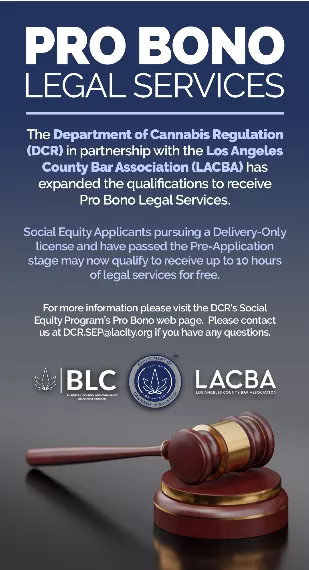
GROW 2022 Cannabis Career Fair
The DCR hosted the GROW 2022 Career Fair on March 18 and 19, 2022. Channel 35 produced a short video highlighting the event.
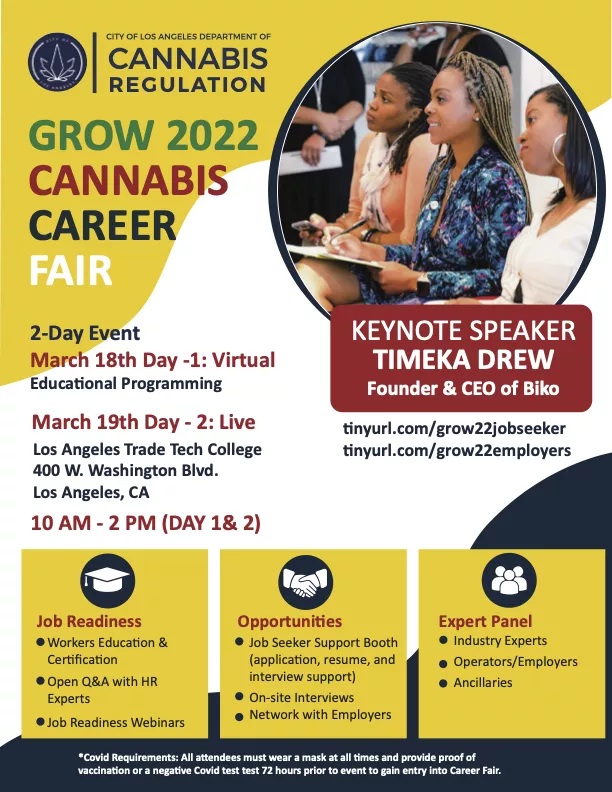
Entrepreneur Spotlight
Tony Fong
Calvin Frye
LEGISLATIVE AND POLICY
Local
On May 31, the Planning and Land Use Committee voted to approve Councilmember Paul Koretz’s motion to start the implementation of an emblem program with the County.
On May 18, 2022 the City Council approved the Fiscal Year 2022-2023 budget. On June 3, 2022, Mayor Garcetti signed the budget. The budget includes authority for 21 new positions within DCR and $3 million in the Unappropriated Balance for the Social Equity Program. It also includes resolution authority and six-months funding for one Administrative Clerk to work on unlicensed cannabis enforcement.
As mentioned above, on April 5, 2022, the City Council approved the Ordinance and Rules and Regulations based on this motion. The ordinance became effective on April 15, 2022. These updatesprovide application process timelines, revise definitions, create a refiling process for Applicants, and clarify the process for Phase 3 Retail Round 2.
State
On March 23, 2022 the City of Los Angeles accepted a $5.7 million grant through the Cannabis Equity Grants Program for Local Jurisdictions The funds will be allocated to cannabis equity applicants and licensees specifically identified by local jurisdictions as being linked to populations or communities that were negatively or disproportionately impacted by cannabis criminalization.
Councilmember Price introduced a resolution supporting State Senate Bill 1293 (Bradford), which would provide Social Equity Program Applicants and Licensees a tax credit in the amount of business expenses not allowed to be claimed as a tax credit under federal law.
With regard to cannabis, Governor Newsom’s budget proposed setting the cultivation tax rate at zero beginning July 1, 2022 and shifting the point of collection and remittance for excise tax from distribution to retail on January 1, 2023, maintaining a 15 percent excise tax rate. Governor Newsom released his proposed 2022-23 state budget on January 10, 2022 and released his revised budget proposal on May 13, 2022. The Governor’s budget must be approved by the state legislature by June 15, 2022 and it must be signed by the Governor by June 30 in order to take effect by the next fiscal year on July 1.
COMMUNICATIONS
SPARK
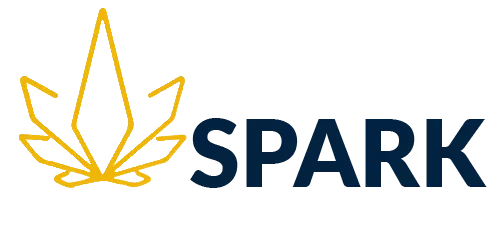
DCR released the SPARK Reportwhich details stakeholder feedback collected by MBI Media throughout SPARK, including the eight Spark Sessions, the virtual meeting rooms, and the SPARK surveys. The stakeholder feedback detailed in the SPARK Report will assist DCR in making future recommendations to the Cannabis Regulation Commission and City Council. Below is a final video that captures commentary from regulators, stakeholders, and entrepreneurs.
DCR is actively working to increase our communication with stakeholders and the community at large while at the same time working with leaders across the globe on cannabis regulation matters. The following are a few examples of DCR’s efforts.
On May 11, 2022, London Mayor Sadiq Khan visited Los Angeles and included a visit with DCR as part of a fact-finding mission on cannabis decriminalization. Currently, the United Kingdom considers cannabis a controlled substance. DCR hosted Mayor Kahn for an honest and robust roundtable discussion with law enforcement, prosecutors, cannabis-industry entrepreneurs and health professionals to provide their own experiences and insights into the decriminalization process. Mayor Khan along with DCR staff also visited a Los Angeles grow facility and retail cannabis shop as part of his Los Angeles tour. Here is what the BBC wrote about the trip.
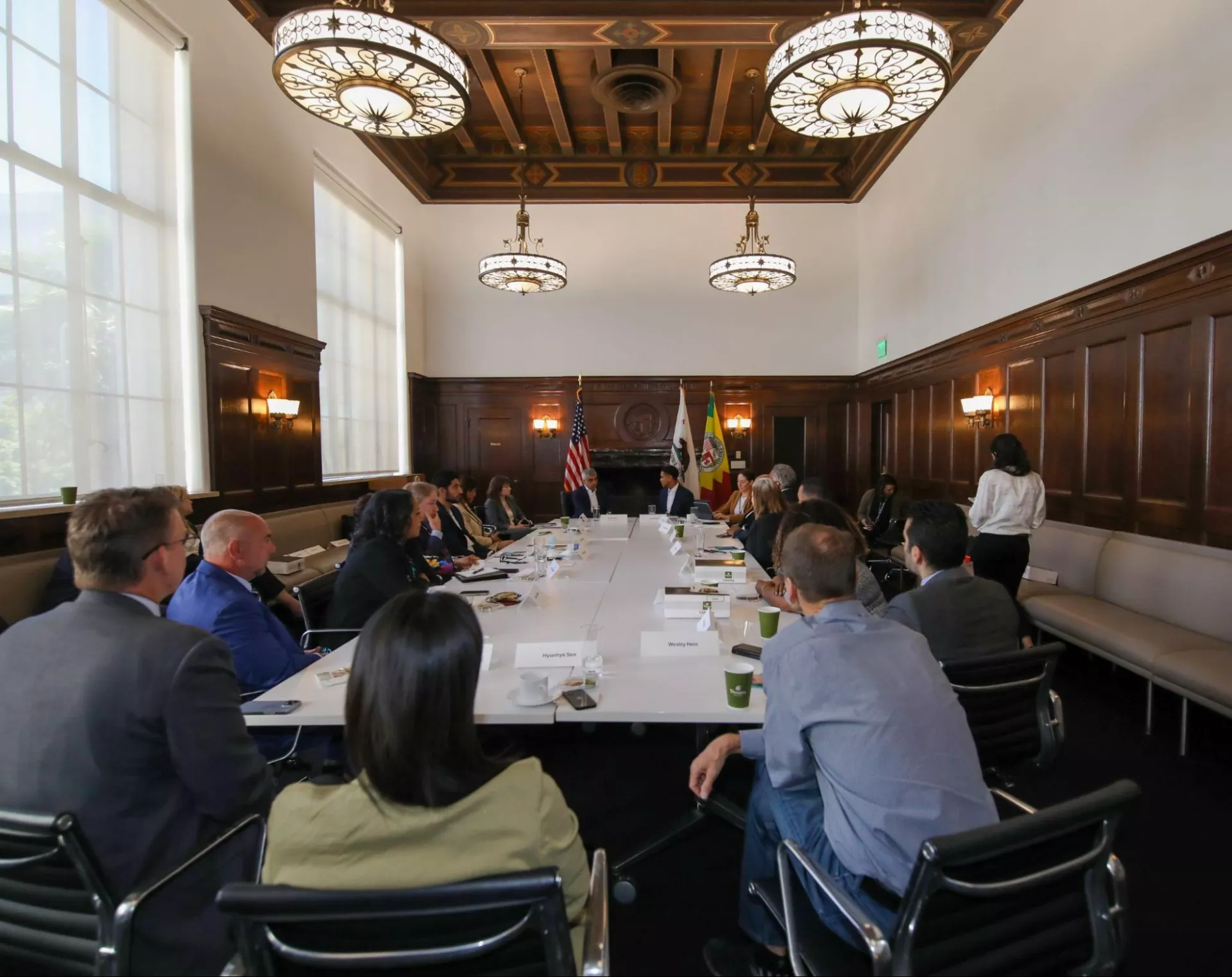
IN THE PRESS
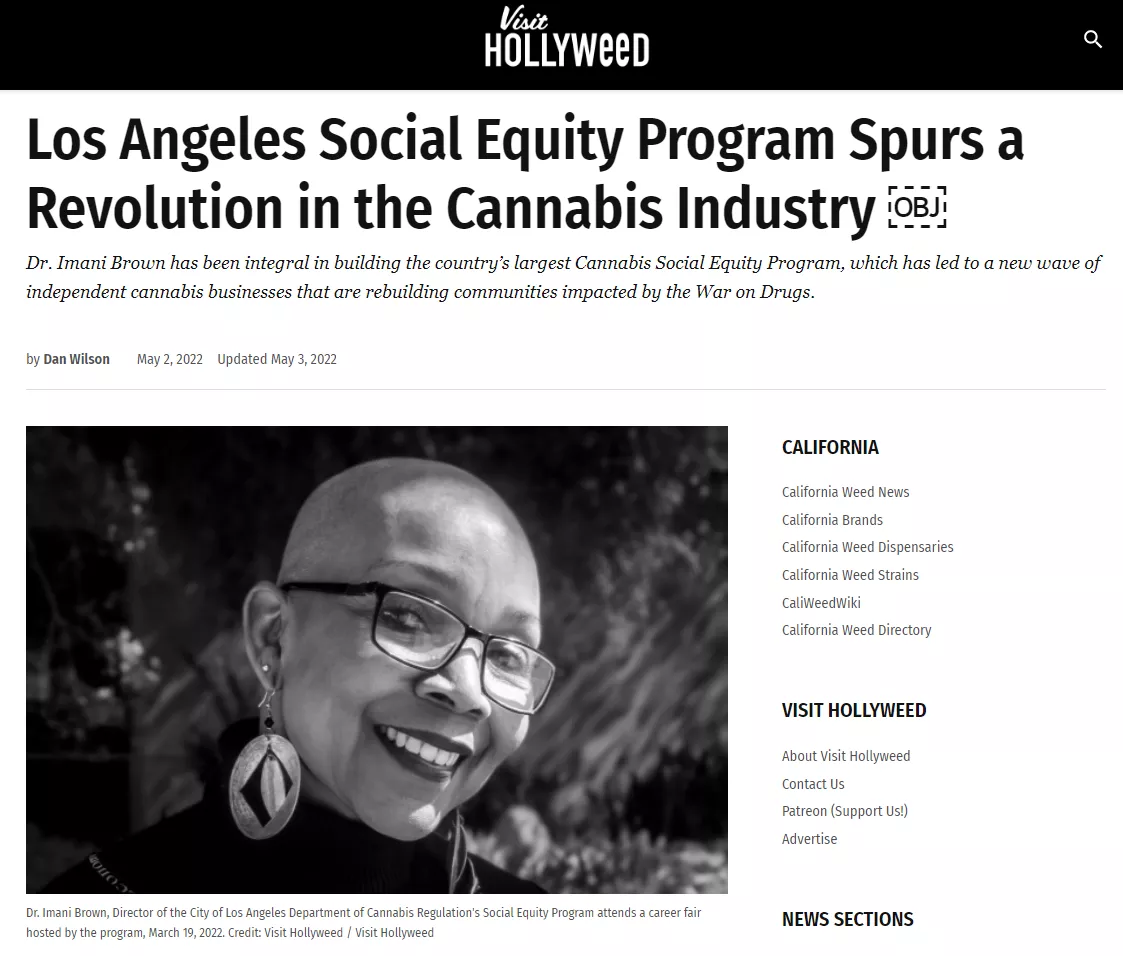
Social Equity Program Director Dr. Imani Brown was interviewed by Visit Hollyweed and discussed the trajectory of the Social Equity Program in this article.
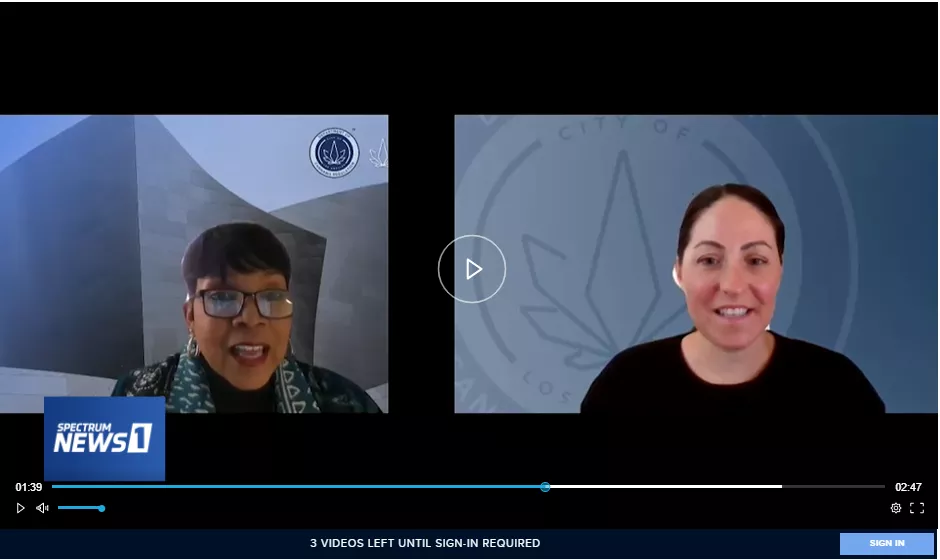
Spectrum News 1 interviewed Social Equity Program Director Dr. Imani Brown (left) and Interim Executive Director Michelle Garakian for a segment on the challenges facing those in the Los Angeles cannabis industry and the efforts the department is making to fine tune the licensing process while also touting DCR’s successes.
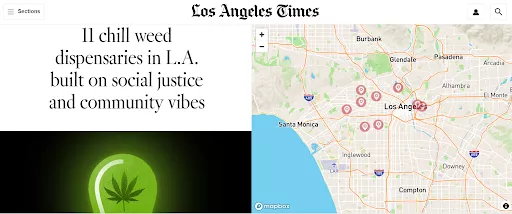
DCR provided data on Social Equity Program licensees for this article, 11 Chill Weed Dispensaries in L.A. Built on Social Justice and Community Vibes, which chronicles the reporter’s visits to 11 shops of social equity verified licensees in the city. This article will be part of a series.
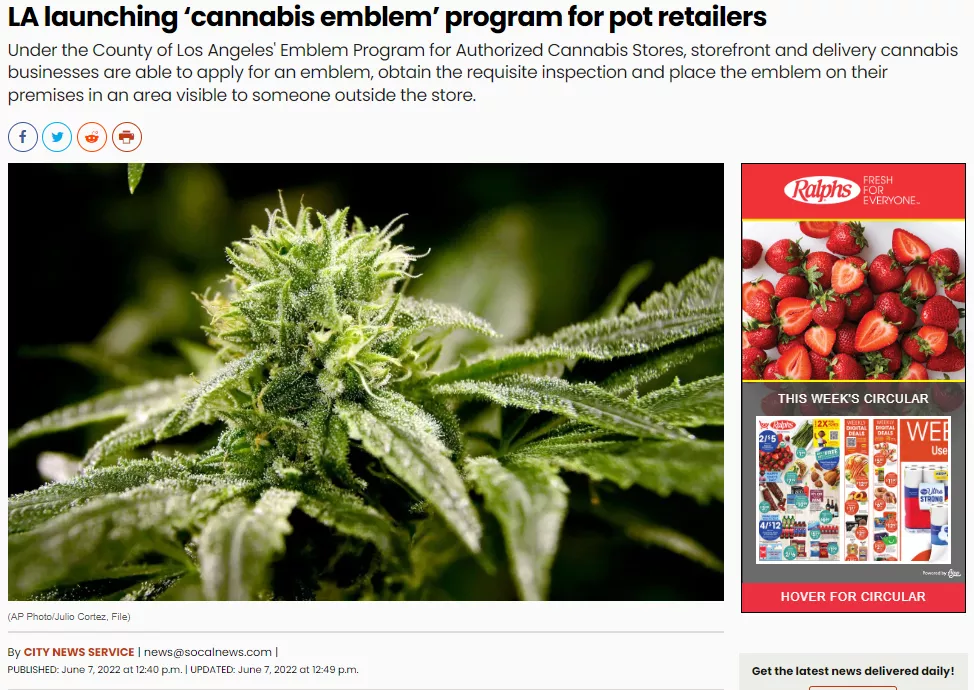
The Daily News ran a story on the DCR and Los Angeles County Department of Public Health joint effort to implement an emblem program designed for consumers to identify legal cannabis retailers. Please note that the emblem program is designed for retail cannabis stores only and not for delivery as specified in the news story.
COMMISSION
The Cannabis Regulation Commission holds public hearings related to the issuance of cannabis business licenses. The Commission may recommend to the City Council amendments to the City's Rules and Regulations.
Meetings of the Commission are open to the public; regular meetings are held on the first and third Thursdays of the month at 2:00 p.m. At this time, DCR is holding all Commission meetings virtually.
The Cannabis Regulation Commission held a meeting on June 9, 2022. A recording of the meeting is available on the DCR website. The next Cannabis Regulation Commission is scheduled for June 30, 2022.
- The current commissioners are:
- Robert Ahn, President
- Thryeris Mason, Vice President
- Jasson Crockett (newly appointed!)
- Victor Narro Rita Villa
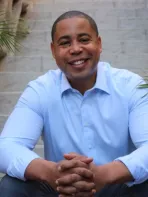
On March 29, 2022, the Mayor nominated Jasson Crockett to fill the vacancy on the Cannabis Regulation Commission created by the resignation of Phillip Mercado. The nomination was approved in the PLUM Committee on May 10, 2022. Crockett leads Public Policy and Government Relations for the Greater Los Angeles Area for Snap Inc. His responsibilities include liaising with local elected leaders, City and County agencies, and community organizations, to advance strategic partnerships and civic initiatives. Prior to joining Snap Inc., Jasson was Director of Community Business in the Office of Los Angeles Mayor Eric Garcetti.
Questions about the Department of Cannabis Regulation can be sent to: CannabisCommission@lacity.org
ADMINISTRATION
DCR has made certain operational changes as described below:
- DCR’s Public Service Counters are currently closed.
- DCR Licensing and Information Services are still available online at cannabis.lacity.org or by phone at 213-978-0738 from 10am to 4pm (Pacific Time).
- Cannabis Regulation Commission meetings will be held virtually using Zoom.
- DCR is conducting virtual inspections.